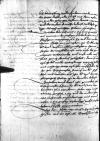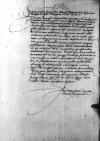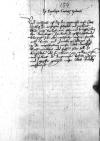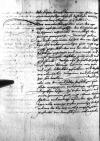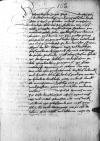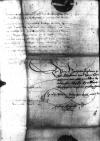Ew(er) H(ochwirdige) G(nade)n ⌊⌋ an uns / auff unser yungstes dancknehmiges schreibenn ynn antwurt gestelt / haben wyr kurczlich vor dato entfangenn / und doraus Ew(er) H(ochwirdige) G(nade)n gnedige czuneygunge. / So sie czu uns / und diesem ihrem ⌊vaterlande⌋, / wie ouch yn sunderheit czu dem bewusten shweren obligen der ko(nigliche)n citacion tregt / und derselbigen sach mildes ende begerende sey / mit erbiethunge der sachen hinfurder nicht abeczustehnn / bsund(er) czu hinlegunge desselbigen vordriszlichenn handels czugedenckenn gewogenn etc. czu gutter notturfft vornommen habenn des wyr uns alles aber unnd abermols dinstlich bedanck(en) und daneben solch furderlich gnediges erpitten yn bsunderer dinstlicher gutter andacht danckbar annehmenn. /
Dasselbige auch yn gleichenn unnd grossernn gerne und mit fleis vordienen wollenn und ist demnoch an Ew(er) H(ochwirdige) G(nade) unser dienstlich pitt / whe sie yrgent auff wege und mittele getrachtet ader noch tracht(en) wurde / als wyr czubescheende gaer nicht czweyfelnn. / Sie wolle das yennige wes sie also des bestenn yhres rathts und bekemen weges bey  AAWO, AB, D.96, f. 152v sich betrachtenn und erfindenn werde / an uns bey czeiger dieses / ader sunst mit denn ersten yn gnaden gelangen lossenn. / Domit wyr uns und die unsern / do mehr bedocht / und deste czeitiger. Dornoch muchten habenn czurichtenn.
AAWO, AB, D.96, f. 152v sich betrachtenn und erfindenn werde / an uns bey czeiger dieses / ader sunst mit denn ersten yn gnaden gelangen lossenn. / Domit wyr uns und die unsern / do mehr bedocht / und deste czeitiger. Dornoch muchten habenn czurichtenn.
Doneben kan sich ouch E(wer) H(ochwirdige) G(nade) ane czweifel wol erynnern / der gnedigen furderlichen / unnd fleissigenn anregung, / so E(wer) H(ochwirdige) G(nade) und die andern hernn rethe / am yungsten czu ⌊Crokaw⌋ bey ⌊ko(nigliche)r ma(ieste)t⌋ unserm allergnedigstenn hernn / yn sachen der Weisselbruche / aus liebe des gemeynen ⌊vaterlandes⌋ und unser aller wolfaert / gancz statlich gelehstett. / Dorauff ouch eczliche ko(niglich)e milde vortrostunge ergang(en) yedoch mit anhange eines eczlichen aufschobes biss der herr ⌊schaczmeister⌋ hinauf an ko(nigliche)n hoff kem / mit welchem sich ihre ⌊ko(niglich)e ma(ieste)t⌋ derweg(en) furgengich hievon czuunderreden bedocht. /
Derhalben / unnd dweil nhu gemelter herr(n) ⌊schaczmeister⌋ sich an die ⌊ko(niglich)e ma(ieste)t⌋ (wie wyr berichtet) thut wendenn / haben wyr nicht unrotig geachtet E(wer) H(ochwirdige) G(nade) und der andern hern wie ouch unser anfurderunge / mit unnd neben E(wer) H(ochwirdige) G(nade) gnedig(en) beistendig(en) vorbit / unsers bestenn fleisses czuernewernn. /
Czu dem achten wyr ouch E(wer) H(ochwirdige) G(nade) unvorbag(?) czu sein / wie ein eczlicher ⌊Engelshma(n)⌋ / bey  AAWO, AB, D.96, f. 155r ⌊ko(nigliche)r ma(ieste)t⌋ unserm allergnedigstenn hernn dornoch bestanden, / das burgerrecht bey uns / widd(er) unsern willen unnd den cleren inhalt unser privilegie czubekommen, / welchs bedrencklichen fals ouch die ⌊ko(nigliche)r ma(ieste)t⌋ dohin bewogenn, / das sie ein koniglich mandat derweg(en) an uns lauts eingelegten copey / hott ergeh(e)n lossenn / unnd dweil denne solchs yegenn unnd widder unser privilegia thut fechtenn. / Szo seint wyr bedocht / der hochgenante ⌊ko(nigliche)r ma(ieste)t⌋ um(m)b underhaltunge unser freiheit undertheniglich anczusuch(e)n / unnd unser freiheit des besten dienstlichenn fleisses czuerbittenn. /
AAWO, AB, D.96, f. 155r ⌊ko(nigliche)r ma(ieste)t⌋ unserm allergnedigstenn hernn dornoch bestanden, / das burgerrecht bey uns / widd(er) unsern willen unnd den cleren inhalt unser privilegie czubekommen, / welchs bedrencklichen fals ouch die ⌊ko(nigliche)r ma(ieste)t⌋ dohin bewogenn, / das sie ein koniglich mandat derweg(en) an uns lauts eingelegten copey / hott ergeh(e)n lossenn / unnd dweil denne solchs yegenn unnd widder unser privilegia thut fechtenn. / Szo seint wyr bedocht / der hochgenante ⌊ko(nigliche)r ma(ieste)t⌋ um(m)b underhaltunge unser freiheit undertheniglich anczusuch(e)n / unnd unser freiheit des besten dienstlichenn fleisses czuerbittenn. /
Hierum(m)be ist an E(wer) H(ochwirdige) G(nade) unser fleissick unnd dienstlich bitt / wolle diesem unserm widdrigen abligenn mit gnediger furderlicher czutaedt beywhonenn / und durch mittel einer vorschrift die ⌊ko(niglich)e ma(ieste)t⌋ dohin bewegenn, / das sie des frembden mannes anregenn, vorlegen / und aber uns bey unsernn privilegien / die nicht alleine uns dem rathe / bsunder ⌊scheppen⌋ unnd ganczen ⌊gemeine⌋ aufs nicht geringen diensten vorliegenn / und von der heuttigen ko(nigliche)n ma(ieste)t stetlich bestettiget / gnediglich czubehalten geruchenn wolle. /
Unnd domit aber E(wer) H(ochwirdige) G(nade) den ynhalt unsers privilegii wissen und yhre vorhafte vorschrift  AAWO, AB, D.96, f. 155v deste sicherer dorauf bawen moge / thuen wyr eine worchaftige abschrift desseselbigen / Ewer H(ochwirdige) G(nade) hirynne vorschlossenn czuschickenn. /
AAWO, AB, D.96, f. 155v deste sicherer dorauf bawen moge / thuen wyr eine worchaftige abschrift desseselbigen / Ewer H(ochwirdige) G(nade) hirynne vorschlossenn czuschickenn. /
Das uns aber furgehalten wirt, / das wyr vorhin eczlichen ⌊Engelschen⌋ das burgerrecht vorliegenn / whorum(m)be denne solchs dem heutigen geweigert etc. Dorauff gebenn wyr diesen gegrunten bescheit, / das wyr desselbigen fals unseren privilegio gaer nicht ungemehsz gehandelt, / das uns der clare context desselbigen geczeuget / und uns maess und macht heimgibt / dasselbige czuthuende und czulossennde. / Welchs also hochloblich(en) gedechtniss ethwan ⌊konige Casimiro⌋ / aus hoem und reiffen bedencken gefallenn / und dasselbig(en) uns allenthalben integrum / und furbehalt(en) hott sein wollenn. /
Dweil wyr aber aus dem / und sidder derselbigen czeit solcher angeczogenen veilehnunge eczlichenn ⌊Engelschen⌋ bescheen / bey unsern burgern / und einem gemeinen gutt / nicht cleinen beschweren hidden by binding⌈[ren]ren hidden by binding⌉ , schedenn und vordriess befunden. Szo seint wyr / alles vormoge unsers privilegii bedocht / und uns des bey uns entlich entschlossenn hinfurder von demselbigenn allenthalben  AAWO, AB, D.96, f. 156r abczustehnde / unnd die ⌊Engelschenn⌋ von unser ⌊stadt⌋ burgerrechte ganczlich abczuhaltenn. /
AAWO, AB, D.96, f. 156r abczustehnde / unnd die ⌊Engelschenn⌋ von unser ⌊stadt⌋ burgerrechte ganczlich abczuhaltenn. /
In gleicher gestalt bitten wyr ouch E(wer) H(ochwirdige) G(nade) uns mit vorschriften an dieselbige ⌊ko(nigliche)r ma(ieste)t⌋ den ⌊Weissel⌋ themmen wie abgedocht czu(m) besten (von welchem obligen E(wer) H(ochwirdige) G(nade) gutt wissen tregt) czu vorleyenn / und dasselbige beides an uns bey czeig(er) dieses yn gnaden ergeh(e)n lossenn. / Szolchs alles / um(m)b E(wer) H(ochwirdige) G(nade) der gebuer herwidderum(m)b czuvordienen wollen wyr stecz unvordrossen befund(en) werdenn. /
Mit der hulffe Gots der E(wer) H(ochwirdige) G(nade) czu langen tagen gesunt und selicklich enthalten musse.
Enclosure No. 1:
 AAWO, AB, D.96, f. 153r
AAWO, AB, D.96, f. 153r
⌊Sigismundus Dei gratia rex Poloniae⌋, magnus dux ⌊Lithuaniae⌋, ⌊Russiae⌋, ⌊Prusiae⌋, ⌊Mazowiae⌋ etc. dominus et heres. /
Famatis ⌊proconsuli et consulibus civitatis nostrae Gedanensis⌋ fidelibus dilectis gratiam nostram regiam.
Famati fideles dilecti. /
Mandaveramus nobis, ut civitatis ius daretis famato huic ⌊Wÿlhelmo Dicktenson⌋. / Quod adhuc factum a vobis non esse miramur et aequo animo ferre non possumus, / neque enim causam ullam videmus, / quam ob rem reiici ⌊eum⌋ a nobis oporteat, / cum neque quicquam eorum defuturum ei dicatur, / quae ad honestum civem pertinent, neque possessiones. / Quare vobis iterum mandamus, ut ⌊eum⌋ in civem vestrum accipiatis, accepto ab eo fidelitatis iuramento, quod ipse ita praestare paratus est, / ut hoc quoque iuratus promittere non recuset se nihil commissurum eorum, de quibus in suspicionem a nonnullis adductus est, / neque cum detrimento cuiusquam contra leges et receptum morem commoda sua acturus.
Secus non facturi sub gravi indignatione nostra. /
Dat(ae) or Dat(um)⌈Dat(ae)Dat(ae) or Dat(um)⌉
⌊Cracoviae⌋, die quarta mensis Iunii anno Domini MDXLIII, regni vero nostri anno trigesimo septimo.
Ad mandatum ⌊sacrae maiestatis⌋ proprium
 AAWO, AB, D.96, f. 152v sich betrachtenn und erfindenn werde / an uns bey czeiger dieses / ader sunst mit denn ersten yn gnaden gelangen lossenn. / Domit wyr uns und die unsern / do mehr bedocht / und deste czeitiger. Dornoch muchten habenn czurichtenn.
AAWO, AB, D.96, f. 152v sich betrachtenn und erfindenn werde / an uns bey czeiger dieses / ader sunst mit denn ersten yn gnaden gelangen lossenn. / Domit wyr uns und die unsern / do mehr bedocht / und deste czeitiger. Dornoch muchten habenn czurichtenn.
 AAWO, AB, D.96, f. 155r
AAWO, AB, D.96, f. 155r  AAWO, AB, D.96, f. 155v deste sicherer dorauf bawen moge / thuen wyr eine worchaftige abschrift desseselbigen / Ewer H(ochwirdige) G(nade) hirynne vorschlossenn czuschickenn. /
AAWO, AB, D.96, f. 155v deste sicherer dorauf bawen moge / thuen wyr eine worchaftige abschrift desseselbigen / Ewer H(ochwirdige) G(nade) hirynne vorschlossenn czuschickenn. /
 AAWO, AB, D.96, f. 156r abczustehnde / unnd die
AAWO, AB, D.96, f. 156r abczustehnde / unnd die 